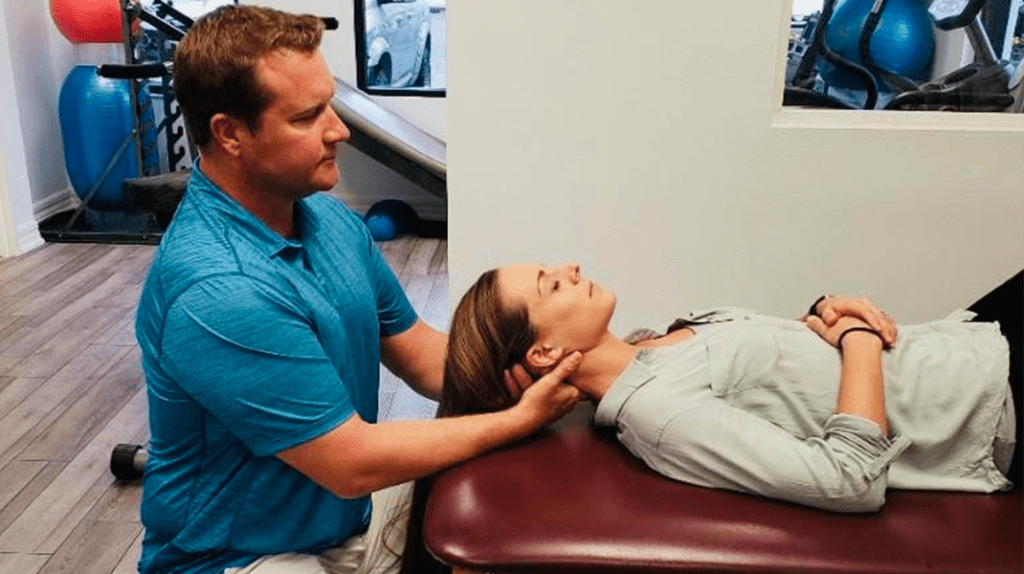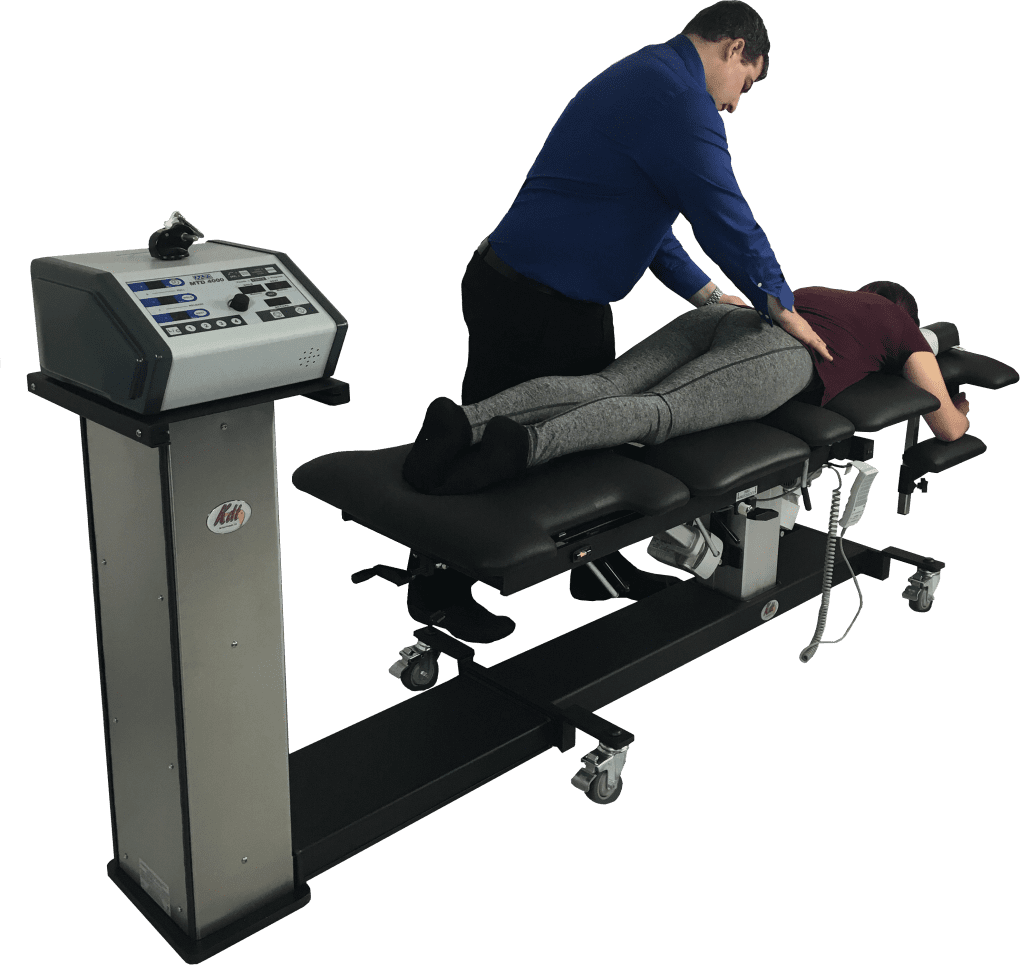Introduction
Dealing with pain in muscles can cause multiple risks, leading to disability and unhappy life. Environmental factors play a role in shaping a person’s health and wellness journey. Eating habits, sleeping patterns, and physical activity levels affect the muscles, tissues, joints, and vital organs, all essential for a healthy body. However, pathogens and environmental factors can cause chronic conditions, challenging the body’s functioning. Fortunately, various treatments can reduce musculoskeletal pain and help revitalize the body. This article will discuss traction therapy and spinal decompression and how they can help alleviate musculoskeletal pain. We utilize and incorporate valuable information about our patients to certified medical providers using non-surgical treatments like traction therapy and spinal decompression to relieve musculoskeletal pain. We encourage and refer patients to associated medical providers based on their findings while supporting that education is a remarkable and fantastic way to ask our providers the essential questions at the patient’s acknowledgment. Dr. Alex Jimenez, D.C., comprises this information as an educational service. Disclaimer
What Is Traction Therapy?
Are you experiencing referred pain in different parts of your body that seem connected? Are your muscles feeling tight or strained? Or have you noticed that you’re hunching over more than usual? If you’re dealing with musculoskeletal pain related to these issues, consider incorporating non-surgical treatments like spinal decompression and traction therapy to alleviate the pain. Research studies have revealed that traction therapy is a commonly used conservative treatment for reducing musculoskeletal pain along the spine. This therapy also reduces pain and relieves pressure on the spinal disc and nerves while restoring joint function. Physical therapists, massage therapists, and chiropractors frequently use traction therapy by applying gentle force to stretch and elongate soft tissues while restoring spine mobility. Traction therapy is known to be effective in treating musculoskeletal disorders such as herniated discs, sciatica, and referred musculoskeletal pain.
How Does It Help Musculoskeletal Pain?
When environmental factors cause pain issues in the body, they can cause damage to the spine, leading to muscles, spinal discs, and nerves compensating for the pain. This can result in referred pain in various body parts. Pain specialists use traction therapy to reduce the effects of musculoskeletal pain. Research indicates that technological changes and living standards can cause musculoskeletal pain and weaken muscle groups. Combined with non-invasive techniques, traction therapy can improve the body’s kinetic function by correcting spinal subluxation, rehydrating, and restoring the spinal disc. It can also help treat chronic musculoskeletal conditions related to spinal subluxation caused by musculoskeletal pain.
Revitalize and Rebuild with Chiropractic Care-Video
Do you suffer from muscle or joint pain, especially in your back? You may have noticed limited mobility or stiffness in your muscles. If so, you may be experiencing musculoskeletal pain associated with your spine. Fortunately, non-surgical treatments, such as spinal decompression and traction therapies, are available, which can help alleviate pressure on your spine and rehydrate your discs. These therapies stretch your muscles gently, reducing referred pain and restoring mobility to the affected joints. The video above demonstrates how these treatments can revitalize your body, reduce pain, and accelerate the healing process naturally. Additionally, physical therapy and chiropractic care can be combined with these treatments to promote optimal health and wellness.
What Is Spinal Decompression?
Have you ever experienced pain in different parts of your body due to issues with your spine? Spinal decompression therapy can help. It can alleviate musculoskeletal disorders associated with the spine and restore your body to normal. Spinal decompression reduces pressure on the spinal disc by gently stretching the spine and increasing hydration, which can decrease stress on the trapped nerve root. Studies have shown that it is a non-surgical option for individuals suffering from musculoskeletal pain.
How Do These Two Therapies Work Together?
“The Ultimate Spinal Decompression,” written by Dr. Eric Kaplan, D.C., FIAMA, and Dr. Perry Bard, D.C., explains that spinal decompression and traction therapy both address musculoskeletal pain related to the spine but in different ways. Traction therapy reduces pressure on the outer part of the spinal disc, while spinal decompression creates negative pressure inside the disc to hydrate it. Both treatments work together to restore blood flow and nutrients to the affected area and promote natural healing. These safe and non-invasive therapies have been reported to reduce pain after just a few sessions.
Conclusion
Regarding musculoskeletal pain, non-surgical treatments like traction therapy and spinal decompression allow the body to naturally heal itself by reducing pain through gentle stretching and remobilizing the joints. These non-invasive treatments help realign the body out of subluxation. Pain specialists can combine traction therapy and spinal decompression with associated therapies to help the individual be more mindful of their bodies while getting them back to their daily routine without worrying about constant pain.
References
Choi, Jioun, et al. “Influences of Spinal Decompression Therapy and General Traction Therapy on the Pain, Disability, and Straight Leg Raising of Patients with Intervertebral Disc Herniation.” Journal of Physical Therapy Science, Feb. 2015, www.ncbi.nlm.nih.gov/pmc/articles/PMC4339166/.
Kaplan, Eric, and Perry Bard. The Ultimate Spinal Decompression. JETLAUNCH, 2023.
Oh, Hyunju, et al. “The Impact of Manual Spinal Traction Therapy on the Pain and Oswestry Disability Index of Patients with Chronic Back Pain.” Journal of Physical Therapy Science, Dec. 2018, ncbi.nlm.nih.gov/pmc/articles/PMC6279706/.
Öten, Erol, et al. “Traction Therapy in Lumbar Disc Hernias: A Finite Element Analysis Study.” Joint Diseases and Related Surgery, 2022, www.ncbi.nlm.nih.gov/pmc/articles/PMC9057540/.
Disclaimer
Post Disclaimer *
Professional Scope of Practice *
The information herein on "A Brief History Between Traction Therapy & Spinal Decompression" is not intended to replace a one-on-one relationship with a qualified health care professional or licensed physician and is not medical advice. We encourage you to make healthcare decisions based on your research and partnership with a qualified healthcare professional.
Blog Information & Scope Discussions
Welcome to El Paso's Premier Fitness, Injury Care Clinic & Wellness Blog, where Dr. Alex Jimenez, DC, FNP-C, a Multi-State board-certified Family Practice Nurse Practitioner (FNP-BC) and Chiropractor (DC), presents insights on how our multidisciplinary team is dedicated to holistic healing and personalized care. Our practice aligns with evidence-based treatment protocols inspired by integrative medicine principles, similar to those found on this site and our family practice-based chiromed.com site, focusing on restoring health naturally for patients of all ages.
Our areas of multidisciplinary practice include Wellness & Nutrition, Chronic Pain, Personal Injury, Auto Accident Care, Work Injuries, Back Injury, Low Back Pain, Neck Pain, Migraine Headaches, Sports Injuries, Severe Sciatica, Scoliosis, Complex Herniated Discs, Fibromyalgia, Chronic Pain, Complex Injuries, Stress Management, Functional Medicine Treatments, and in-scope care protocols.
Our information scope is multidisciplinary, focusing on musculoskeletal and physical medicine, wellness, contributing etiological viscerosomatic disturbances within clinical presentations, associated somato-visceral reflex clinical dynamics, subluxation complexes, sensitive health issues, and functional medicine articles, topics, and discussions.
We provide and present clinical collaboration with specialists from various disciplines. Each specialist is governed by their professional scope of practice and their jurisdiction of licensure. We use functional health & wellness protocols to treat and support care for musculoskeletal injuries or disorders.
Our videos, posts, topics, and insights address clinical matters and issues that are directly or indirectly related to our clinical scope of practice.
Our office has made a reasonable effort to provide supportive citations and has identified relevant research studies that support our posts. We provide copies of supporting research studies upon request to regulatory boards and the public.
We understand that we cover matters that require an additional explanation of how they may assist in a particular care plan or treatment protocol; therefore, to discuss the subject matter above further, please feel free to ask Dr. Alex Jimenez, DC, APRN, FNP-BC, or contact us at 915-850-0900.
We are here to help you and your family.
Blessings
Dr. Alex Jimenez DC, MSACP, APRN, FNP-BC*, CCST, IFMCP, CFMP, ATN
email: [email protected]
Multidisciplinary Licensing & Board Certifications:
Licensed as a Doctor of Chiropractic (DC) in Texas & New Mexico*
Texas DC License #: TX5807, Verified: TX5807
New Mexico DC License #: NM-DC2182, Verified: NM-DC2182
Multi-State Advanced Practice Registered Nurse (APRN*) in Texas & Multi-States
Multistate Compact APRN License by Endorsement (42 States)
Texas APRN License #: 1191402, Verified: 1191402 *
Florida APRN License #: 11043890, Verified: APRN11043890 *
Verify Link: Nursys License Verifier
* Prescriptive Authority Authorized
ANCC FNP-BC: Board Certified Nurse Practitioner*
Compact Status: Multi-State License: Authorized to Practice in 40 States*
Graduate with Honors: ICHS: MSN-FNP (Family Nurse Practitioner Program)
Degree Granted. Master's in Family Practice MSN Diploma (Cum Laude)
Dr. Alex Jimenez, DC, APRN, FNP-BC*, CFMP, IFMCP, ATN, CCST
My Digital Business Card
RN: Registered Nurse
APRNP: Advanced Practice Registered Nurse
FNP: Family Practice Specialization
DC: Doctor of Chiropractic
CFMP: Certified Functional Medicine Provider
MSN-FNP: Master of Science in Family Practice Medicine
MSACP: Master of Science in Advanced Clinical Practice
IFMCP: Institute of Functional Medicine
CCST: Certified Chiropractic Spinal Trauma
ATN: Advanced Translational Neutrogenomics





